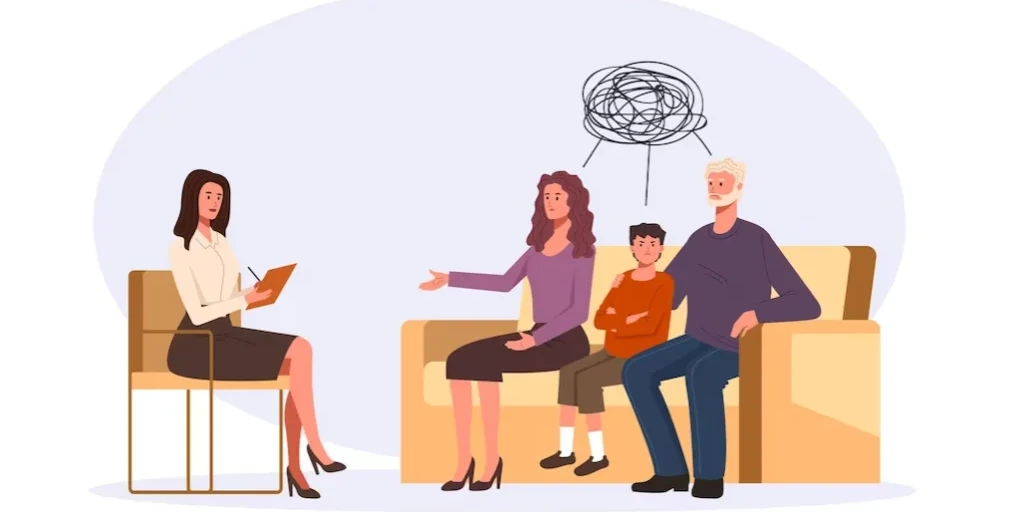24/7 Helpline:
(866) 899-111424/7 Helpline:
(866) 899-1114
Learn more about Depression Treatment centers in Santee
Depression Treatment in Other Cities

Other Insurance Options

BHS | Behavioral Health Systems

Private insurance

Absolute Total Care

Oxford

MVP Healthcare

Access to Recovery (ATR) Voucher

Multiplan

American Behavioral

Amerigroup

Choice Care Network

Health Choice

Excellus

Holman Group

WellPoint

Optum

Providence

Medical Mutual of Ohio

Ambetter

Lucent

Self-pay options

Domestic Violence – Santee Family Counseling
Domestic Violence – Santee Family Counseling is a private rehab located in Santee, California. Domes...

Tri-County Commission on Alcohol and Drug Abuse – Santee Office
Tri-County Commission on Alcohol and Drug Abuse in an outpatient facility that provides treatment fo...

MHS – ACTION East
Located in Santee, California, MHS – ACTION East is a drug and alcohol rehab that treats adults with...




Akua Detox San Diego
Akua Detox San Diego is a private rehab located in San Diego, California. Akua Detox San Diego speci...

Casa Palmera
Casa Palmera, in Del Mar, California, is a luxury, 12 ste-ofucsed drug and alcohol rehab for adults ...

AToN Center
AToN Center is a residential substance misuse and detox facility. We emphasize individualized treatm...

Soledad House
Soledad House offers inpatient treatment for women with alcohol and/or substance addiction. The prog...

El Cajon Treatment Clinic
Located at Located at 234 N. Magnolia Avenue in El Cajon, California, the El Cajon Treatment Center/...

South Bay Pioneers
South Bay Pioneers is a non-profit rehab located in Chula Vista, California. South Bay Pioneers spec...

Hanbleceya Treatment Center
Hanbleceya Treatment Center, now BrightQuest, is a co-occurring drug and alcohol addiction rehab cen...

Choices in Recovery
Located in Vista, California, Choices in Recovery is a drug and alcohol rehab for adults with substa...

Psychiatric Centers At San Diego
Psychiatric Centers At San Diego offers outpatient services for individuals that have a Mental Healt...

San Diego PACE
San Diego PACE, a division of San Ysidro Health, Inc., is a specialized health plan that provides hi...

Douglas Young Center
Douglas Young Center is a private rehab located in San Diego, California. Douglas Young Center speci...

Community Research Foundation
Community Research Foundation is a private rehab located in San Diego, California. Community Researc...

Areta Crowell Center
Areta Crowell Center is a non-profit rehab located in San Diego, California. Areta Crowell Center sp...

Turning Point Crisis Center
Turning Point Crisis Center is a short-term acute residential treatment facility located in Oceansid...

Maria Sardinas Wellness and Recovery Center
Maria Sardinas Wellness and Recovery is a drug and alcohol rehab center located in San Diego, CA. Th...

Alvarado Parkway Institute Behavioral Health System Outpatient Services
API - Alvarado Parkway Institute offers outpatient services for individuals with mental health disor...

Vista Balboa Crisis Center
Vista Balboa Crisis Center is a private rehab located in San Diego, California. Vista Balboa Crisis ...

South Bay Women’s Recovery Center
South Bay Women’s Recovery Center is a private rehab located in National City, California. South Bay...

Scripps Drug and Alcohol – Treatment Center
Scripps Drug and Alcohol Treatment Center works with The Betty Ford Center to provide addiction trea...

The Fellowship Center
The Fellowship Center, in Escondido, California, is a 12 step focused drug and alcohol rehab for adu...

Parent Care Family Recovery Center
Parent Care Family Recovery Center is a private rehab located in La Mesa, California. Parent Care Fa...

Veterans Village of San Diego
Veterans Village of San Diego is a non-profit organization located in San Diego, CA. Veterans Rehabi...

Adult Children of Alcoholics
Adult Children of Alcoholics - Broadway offers outpatient services for adults whose lives were affec...

McAlister Institute for Treatment and Education – East County Adolescent Detox
McAlister Institute for Treatment and Education–East County Adolescent Detox is an inpatient addicti...

Downtown Impact
Downtown Impact is a drug and alcohol rehab that supports adults with substance use disorders. Locat...

Fashion Valley Comprehensive Treatment Center
Fashion Valley Comprehensive Treatment Center is a private rehab located in San Diego, California. F...

MHS – North Inland Mental Health Center
MHS - North Inland Mental Health Center is a mental health clinic for adults with severe and chronic...

Community Research Foundation – New Vistas
Community Research Foundation – New Vistas is a private rehab located in San Diego, California. Comm...

Sharp Mesa Vista – East County Outpatient
Sharp Mesa Vista Hospital offers outpatient services for individuals with mental health disorders an...

SOAP MAT
SOAP MAT is a private rehab located in Oceanside, California. SOAP MAT specializes in the treatment ...

Way Back
The Way Back is an alcohol and drug treatment center in San Diego, California for men. The center pl...

Jewish Family Services – San Diego
Jewish Family Services–San Diego provides outpatient mental and behavioral health care for youth and...

MHS – San Diego Center for Change
MHS - San Diego Center for Change is the case management and treatment provider for San Diego’s Cent...

Volunteers of America Southwest – Veterans Service Center
Volunteers of America Southwest – Veterans Service Center is a private rehab located in El Cajon, Ca...

East County Mental Health
East County Mental Health is a public rehab located in El Cajon, California. East County Mental Heal...

Paradise Valley Hospital – Behavioral Health
Paradise Valley Hospital – Behavioral Health is a private rehab located in National City, California...

San Diego Addiction Treatment Center
San Diego Addiction Treatment Center offers inpatient treatment for men with alcohol and/or substanc...

Mental Health Systems – Re Entry Program
Mental Health Systems – Re Entry Program is a private rehab located in San Diego, California. Mental...

MHS – Center Star ACT
MHS - Center Star ACT program offers 24-hour community-based treatment for individuals with a crimin...

Restoration Ranch
Restoration Ranch is a private rehab for men located in Ramona , CA. Restoration Ranch specializes i...

Practical Recovery
Practical Recovery is a non-12 step rehab that provides outpatient programs for individuals with add...

McAlister Institute – Adolescent Residential
McAlister Institute - Adolescent Residential offers a residential detox treatment for teens. Additio...

San Diego County – Mental Health Services
San Diego County – Mental Health Services is a public rehab located in San Diego, California. San Di...

San Diego Health Alliance North Office
San Diego Health Alliance North Office is a private rehab located in San Marcos, California. San Die...

Pathfinders
Pathfinders runs a residential program for men recovering from alcoholism problems and co-occurring ...

Alano Club
Alano Club is a non-profit rehab located in San Diego, California. Alano Club specializes in the tre...

MHS – ACTION Central
MHS - ACTION Central serves homeless adults who need a higher level of support than that which is of...

Teen Challenge
Teen Challenge in San Diego County is a trusted center that provides a comprehensive and faith based...

MAAC – Nosotros
MAAC–Nosotros is a 12 step focused addiction recovery home for adult men in Chula Vista, California....

Green Oak Ranch
In addition to 100 acres of outdoor space to support camps and retreats, Green Oak Ranch provides a ...

Heartland House
Heartland House is a residential treatment for men who are dealing with substance abuse and co-occur...

North County Serenity House – Serenity Too
North County Serenity House – Serenity Too is a private rehab located in Escondido, California. Nort...

San Diego Rescue Mission – Haven of Hope
San Diego Rescue Mission – Haven of Hope is a private rehab located in San Diego, California. San Di...

Crossroads Foundation
Crossroads Foundation is a private rehab located in San Diego, California. Crossroads Foundation spe...

Community Resource Health Group
Community Resource Health Group is a private rehab located in San Marcos, California. Community Reso...

MAAC – Casa de Milagros
Casa De Milagros is a residential addiction treatment center for women located in San Diego, Califor...

Lasting Recovery Outpatient
Lasting Recovery Outpatient offers outpatient and intensive outpatient treatment for individuals wit...

Kiva Learning Center for Women and Children & New Connections
The McAlister Institute’s Kiva Learning Center for Women and Children and New Connections are addict...

Bayview Behavioral Health Campus
Paradise Valley Hospital- Bayview Behavioral Health Campus provides person centered care for mental ...

Alpha Project – Casa Raphael
Alpha Project is a nonprofit human services organization that serves over 4,000 men, women, and chil...

Turning Point Home
Turning Point Home offers inpatient treatment for women with alcohol and/or substance addiction. Tur...

Aurora Behavioral Health Care
Aurora Behavioral Health Care - Avenue of Industry offers outpatient and inpatient services for indi...

The Lighthouse Community
The Lighthouse Community in San Diego, California, is a comprehensive drug and alcohol rehab for adu...

California Highlands Addiction Treatment Vistas
California Highlands Addiction Treatment Vistas aims to succeed in treating those suffering from add...

San Diego Freedom Ranch
San Diego Freedom Ranch, in Campo, California, is a 12 step-focused drug and alcohol rehab for adult...

CRASH Golden Hill House II
Crash - Short Term II is a residential rehab for women located in San Diego , California. Crash - Sh...

Evolve Treatment Centers for Teens
Evolve Treatment Centers for Teens - Sorrento Valley Road is located in San Diego, California. Evolv...

Psychiatric Centers At San Diego – Hotel Circle North
Psychiatric Centers At San Diego - Hotel Circle North offers outpatient services for individuals tha...

Volunteers of America – Renaissance Treatment Center
Volunteers of America - Renaissance Treatment Center offers a short and long-term residential progra...

Psychiatric Centers At San Diego
Mindpath Health, formerly Psychiatric Centers at San Diego (PCSD), provides mental and behavioral he...

Psychiatric Centers At San Diego – Bernardo Plaza Ct
Psychiatric Centers At San Diego - Bernardo Plaza Ct offers outpatient services for individuals that...

Psychiatric Centers At San Diego – Mission Valley
Psychiatric Centers At San Diego - Mission Valleyoffers outpatient services for individuals that hav...

Present Moments Recovery
Present Moments Recovery provides an evidence-based, holistic treatment approach to drug addiction a...

Restore Detox Centers
Restore Detox Centers is a 24 hour, residential, non-medical, alcohol and drug use treatment facilit...

SHORELINE Recovery Center
SHORELINE Recovery Center offers an Intensive Outpatient Program for clients struggling with both dr...

Sober Life Recovery Solutions
Sober Life Recovery Solutions is an In-Network Substance Abuse and Mental Health PHP/IOP/OP program ...

Palms Detox
Palms Detox offers fully comprehensive programs specifically tailored to the needs of each client. T...

Mindful Rejuvenation
Mindful Rejuvenation is a private rehab center located in Oceanside, California. Mindful Rejuvenatio...

Present Moments Recovery – Harding Street
Present Moments Recovery – Harding Street is a private rehab located in Carlsbad, California. Presen...

Discovery Mood & Anxiety Program – Vista
Discovery Mood & Anxiety Program – Vista is a private rehab located in Vista, California. Discovery ...

Paradise Detox
Paradise Detox provides continuous support and the highest quality care throughout the recovery proc...

Narconon Warner Springs
Narconon Warner Springs is a private rehab located in Warner Springs, California. Narconon Warner Sp...

Hope Canyon Recovery
Hope Canyon Recovery is a premier San Diego treatment facility dedicated to combating the growing su...

Villa Kali Ma
Villa Kali Ma is a private rehab center got women located in Carlsbad, California. Villa Kali Ma spe...

Center for Discovery Del Mar
Center for Discovery Del Mar is a private rehab located in San Diego, California. Center for Discove...

Drescher Street Sober Living
As an alcohol and drug free home, DSSL supports treatment and recovery services in the community by ...

Real Hope Recovery
Real Hope Recovery is a private rehab located in San Diego, California. Real Hope Recovery provide h...

Center for Discovery La Jolla
Center for Discovery La Jolla is a private rehab located in San Diego, California. Center for Discov...

A Ka Center
A Ka Center is a private rehab located in La Mesa, California. A Ka Center specializes in the treatm...

BrightQuest – San Diego
BrightQuest – San Diego is a private rehab located in La Mesa, California. BrightQuest – San Diego s...

Aurora Behavioral Health Care San Diego
Aurora Behavioral Health Care San Diego is a private rehab located in San Diego, California. Aurora ...

Being True To You
Being True To You is a coaching company that provides coaching services for addiction recovery and p...

La Jolla Addiction Healing Center
La Jolla Addiction Healing Center is an intensive outpatient treatment dedicated to help those indiv...

Pacific Bay Recovery
Pacific Bay Recovery is a drug and alcohol treatment center in San Diego, California that supports a...

Six Step House
Six Step House is an outpatient rehab for men and women located in Encinitas, CA. Six Step House spe...

Stepping Stone of San Diego – Residential
Stepping Stone of San Diego – Residential is a private rehab located in San Diego, California. Stepp...

West Coast Recovery Centers
West Coast Recovery Centers is a private rehab located in Oceanside, California. West Coast Recovery...

MHS – Families Forward Wraparound
MHS - Families Forward Wraparound provides mental health and supportive services with a team of cari...

MHS – School Based Program
MHS - School Based Program provides mental health services to students at eleven schools in the San ...

House of Metamorphosis HOM
House of Metamorphosis is a residential drug program and alcohol treatment program located in San Di...

Pacific Palms Recovery
Pacific Palms Recovery - Mesa Drive offers outpatient and intensive outpatient treatment for individ...

Douglas Young Youth and Family Service
Douglas Young Youth and Family Service is a private rehab located in San Diego, California. Douglas ...

San Diego Behavioral Health – Southeast
San Diego Behavioral Health – Southeast is a public rehab located in San Diego, California. San Dieg...

San Diego American Indian Health Center
San Diego American Indian Health Center is an outpatient rehab located in San Diego, CA. San Diego A...

HealthRIGHT 360 – North County Serenity House
HealthRIGHT 360 - North County Serenity House is a non-profit rehab located in Escondido, CA. Health...

MHS – Family Recovery Center – FRC
MHS Family Recover Center, located in Oceanside, California, is a women’s addiction treatment center...

MHS – Courage to Call Family Forces
MHS - Courage to Call/Family Forces is a veteran-run, peer-to-peer support program in San Diego Coun...

MHS – Harmony
MHS - Harmony is a gender responsive, non-residential treatment and recovery center dedicated to hel...

MHS – North Coastal Mental Health Center
Located in Oceanside, California, MHS – North Coastal Mental Health Center — now called TURN Behavio...

MHS – Federal Probation Program – FPP
MHS - Federal Probation Program (FPP) provides mental health and substance abuse services for indivi...

San Diego Lighthouse
San Diego Lighthouse offers inpatient treatment for individuals with alcohol and/or substance addict...

Carlsbad Mental Health – Villa de Esperanza
Golden Services - Villa de Esperanza is a private rehab located in Carlsbad, NM. Golden Services - V...

South Nassau Communities Hospital – Inpatient
South Nassau Communities Hospital – Inpatient is a private rehab located in Oceanside, New York. Sou...

San Marcos Treatment Center
San Marcos Treatment Center is a behavioral health treatment facility for based in San Marcos, TX. S...

Positive Recovery Center – San Marcos
Positive Recovery Center – San Marcos is a private rehab located in San Marcos, Texas. Positive Reco...












































































































































































































































































PsyCare Associates
LifeStance Health, formerly PsyCare Associates, is an outpatient mental and behavioral health care f...

Alcoholism Consultants of America
Alcoholism Consultants of America is a private rehab located in Poway, California. Alcoholism Consul...

Home Stretch – Residential
Home Stretch – Residential is a private rehab located in San Diego, California. Home Stretch – Resid...

Fred Finch Youth Center – Dual Diagnosis
Fred Finch Youth Center – Dual Diagnosis is a private rehab located in Lemon Grove, California. Fred...

North County Alano Club
North County Alano Club is a private rehab located in Oceanside, CA. North County Alano Club special...

Tender Loving Mercy
Tender Loving Mercy is a non-profit rehab located in Oceanside, California. Tender Loving Mercy spec...

Mira Mesa Alano Club
Mira Mesa Alano Club is a private rehab located in San Diego , CA. Mira Mesa Alano Club specializes ...

Poway Alano Club
Poway Alano Club is a non-profit rehab located in Poway, California. Poway Alano Club specializes in...

Substance Abuse Counseling Center – SACC
Substance Abuse Counseling Center (SACC) provides substance abuse services to Marines and Sailors in...

Simplicity Sober Living
Simplicity Sober Living is a private rehab located in La Mesa, California. Simplicity Sober Living s...

Euclid Family Counseling Center
Euclid Family Counseling Center is a private rehab located in San Diego, California. Euclid Family C...

Rancho Coast Recovery
Rancho Coast Recovery is a private sober living house located in San Diego, CA. Rancho Coast Recover...

South Bay Dual Recovery Services
South Bay Dual Recovery Services is a private rehab located in Chula Vista, California. South Bay Du...

Post Adolescent Recovery Center
Post Adolescent Recovery Center is a private rehab located in Escondido, California. Post Adolescent...

Choices in Recovery – Foundation House
Choices in Recovery – Foundation House is a private rehab located in Vista, California. Choices in R...

Bethesda Recovery Center
Bethesda Recovery Center is a residential facility that offers treatment for individuals with a Ment...

Harmony Women’s Recovery Center
Harmony Women’s Recovery Center is a private rehab located in San Diego, California. Harmony Women’s...

New Horizon Recovery
New Horizon Recovery provides every client with an individualized clinical care treatment plan. New ...

Broad Horizons
Broad Horizons is a private rehab located in Ramona, California. Broad Horizons specializes in the t...

Vista Hill Foundation – Parent Care
Vista Hill Foundation–Don Allen ParentCare Family Recovery Center, in San Diego, California, provide...

Substance Abuse Evaluation – Resource Center
Substance Abuse Evaluation – Resource Center is a private rehab located in San Diego, California. Su...

Substance Abuse Counseling Center – Behavioral Health
Substance Abuse Counseling Center is a public rehab located in San Diego, CA. Substance Abuse Counse...

Sober Ranch
Sober Ranch is a private rehab located in Palomar Mountain, California. Sober Ranch specializes in t...

ABC Sober Living – Soledad House
ABC Sober Living–Soledad House is a luxury, 12 step-focused drug and alcohol rehab for adult women i...

Active Recovery
Active Recovery is a private rehab located in Encinitas, CA. Active Recovery specializes in the trea...

Brisas Outpatient
Brisas Outpatient is a private rehab located in La Jolla, California. Brisas Outpatient specializes ...

CRASH Short Term I
CRASH Short Term I is a private rehab located in San Diego, California. CRASH Short Term I specializ...

Nicotine Recovery Institute
Nicotine Recovery Institute is a private rehab located in San Diego, California. Nicotine Recovery I...

Alternative Community Services of Northpark
Alternative Community Services of Northpark is a private rehab located in San Diego, California. Alt...

Bay Recovery
Bay Recovery is a private rehab located in San Diego, California. Bay Recovery specializes in the tr...

Ann Clark Associates
Ann Clark Associates is a private rehab located in San Diego, California. Ann Clark Associates speci...

North County Serenity House – Women and Children
North County Serenity House – Women and Children is a private rehab located in Escondido, California...

Youth Enhancement Services
Youth Enhancement Services is a public rehab located in San Diego, California. Youth Enhancement Ser...

San Diego Rescue Mission – Men’s Center
San Diego Rescue Mission–Men’s Center, in San Diego, California, is a faith-based, 12 step-focused d...

Alcoholism and Chemical Dependency Family Program
Alcoholism and Chemical Dependency Family Program offers outpatient treatment for individuals with a...

Ray of Hope Ranch
Ray of Hope Ranch is a private rehab located in Fallbrook, California. Ray of Hope Ranch specializes...

CRASH Bill Dawson Residential Recovery
CRASH Bill Dawson Residential Recovery is a private rehab located in San Diego, California. CRASH Bi...

Family Treatment Center
Family Treatment Center is a private rehab located in Vista, California. Family Treatment Center spe...

South Bay Guidance Center
South Bay Guidance Center is a private rehab located in Chula Vista, California. South Bay Guidance ...

CRASH Options for Recovery Central
CRASH Options for Recovery Central is a private rehab located in San Diego, California. CRASH Option...

South Bay Women’s Recovery Home
South Bay Women’s Recovery Home is a private rehab located in San Diego, California. South Bay Women...

Alano Club
Alano Club is a non-profit rehab located in El Cajon, California. Alano Club specializes in the trea...

Pemarro Recovery Center
Pemarro Recovery Center is a non-profit rehab located in Ramona, California. Pemarro Recovery Center...

Mission Treatment Services
Mission Treatment Services is a private rehab located in Escondido, California. Mission Treatment Se...

McAlister Institute of Escondido
McAlister Institute of Escondido is a drug and alcohol rehab located in Escondido, California that s...

Mental Health Systems – Pegasus West
Mental Health Systems – Pegasus West is a private rehab located in Oceanside, California. Mental Hea...

McCalister South Region Women
McCalister South Region Women is a private rehab located in National City, California. McCalister So...

AA – Alcoholics Anonymous – San Diego
AA – Alcoholics Anonymous – San Diego is a non-profit rehab located in San Diego, California. AA – A...

Alcohol Drug and Criminal Justice Programs
Alcohol Drug and Criminal Justice Programs is a private rehab located in El Cajon, California. Alcoh...

Rebuild
Rebuild is a private rehab located in Oceanside, California. Rebuild specializes in the treatment of...

Tradition One
Tradition One is a non-profit rehab located in San Diego, CA. Tradition One offers treatment for adu...

CRASH – Tim Huddleston Regional Recovery Center
CRASH – Tim Huddleston Regional Recovery Center is a private rehab located in San Diego, California....

MHS – East County Center for Change
MHS - East County Center for Change is the case management and treatment provider for San Diego’s Ea...

Sovereign Health
Sovereign Health provides mental health and substance abuse services for adolescents. They offer tre...

Nueva Vista Family Services
Nueva Vista Family Services is a private rehab located in Chula Vista, California. Nueva Vista Famil...

McAlister Institute – Teen Recovery Center
McAlister Institute - Teen Recovery Center is a nonprofit drug and alcohol rehab located in El-Cajon...

Rejuvenations Outpatient Facility
Rejuvenations Outpatient Facility is a private rehab located in San Diego, California. Rejuvenations...

Amity Foundation
Amity Foundation is a private rehab located in Vista, California. Amity Foundation specializes in th...

Phoenix House Academy
Phoenix House Academy is a private rehab located in Descanso, California. Phoenix House Academy spec...

La Costa Solutions for Women
La Costa Solutions for Women, in Carlsbad, California, provides comprehensive addiction treatment fo...

Community Connection Resource Center
Community Connection Resource Center is a non-profit rehab located in San Diego, California. Communi...

Freedom House
Freedom House is a private rehab located in San Diego, California. Freedom House specializes in the ...

Tri City Medical Center Intensive Outpatient
Located in Vista, California, Tri City Medical Center Intensive Outpatient is a drug and alcohol tre...

Southern Indian Health Council – La Posta Substance Abuse Center
Southern Indian Health Council - La Posta Substance Abuse Center is a public rehab located in Boulev...

Palomar Health – Outpatient
Palomar Health–Outpatient, in San Marcos, California, offers outpatient mental and behavioral health...

McAlister Institute – East Teen Recovery Center
McAlister Institute – East Teen Recovery Center is a non-profit rehab located in El Cajon, Californi...

DK Sober Living Too
DK Sober Living Too is a private rehab located in La Mesa, California. DK Sober Living Too specializ...

Rancho L’abri
Rancho L’abri is a private rehab located in San Diego, California. Rancho L’abri specializes in the ...

Third Avenue Clinic – Acadia Health Group
Third Avenue Clinic – Acadia Health Group is a private rehab located in Chula Vista, California. Thi...

Veterans Village of San Diego – New Resolve
Veterans Village of San Diego – New Resolve is a private rehab located in Escondido, California. Vet...

Alano Club
Alano Club is a non-profit rehab located in Lemon Grove, California. Alano Club specializes in the t...

AA – Alcoholicos Anonimos
AA – Alcoholicos Anonimos is a non-profit rehab located in Vista, California. AA – Alcoholicos Anoni...

Palavra Tree
Palavra Tree is a private rehab located in San Diego, California. Palavra Tree specializes in the tr...

AA – Alcoholicos Anonimos – Oficina Central Hispana
AA – Alcoholicos Anonimos – Oficina Central Hispana is a non-profit rehab located in San Diego, Cali...

McAlister Institute – SBRRC
McAlister Institute – SBRRC is a drug and alcohol rehab located in Chula Vista, CA. They provide out...

Clinical Addiction Recovery Insitute
Clinical Addiction Recovery Insitute is a private rehab located in Encinitas, California. Clinical A...

Mission Treatment Services
Mission Treatment Services is a private rehab located in San Diego, California. Mission Treatment Se...

Practical Recovery – Carmel Summit Retreat
Practical Recovery – Carmel Summit Retreat is a private rehab located in San Diego, California. Prac...

Access Treatment Center
Access Treatment Center is a private rehab located in San Diego, California. Access Treatment Center...

South Bay Community Services – Teen Recovery Center
South Bay Community Services – Teen Recovery Center is a non-profit rehab located in Chula Vista, Ca...

East County Regional Recovery Center
At East County Regional Recovery Center, services include assessment, treatment planning, individual...

The Crosby Centers
The Crosby Centers is a private rehab located in Escondido, California. The Crosby Centers specializ...

Kaiser Permanente – Chemical Dependency
Kaiser Permanente – Chemical Dependency is a private rehab located in San Diego, California. Kaiser ...

MHS – Teen Recovery Center – North Inland
MHS - Teen Recovery Center - North Inland provides outpatient substance abuse services to adolescent...

Intergrupal – Al Anon
Intergrupal – Al Anon is a non-profit rehab located in Escondido, California. Intergrupal – Al Anon ...

Solutions For Recovery – Family Health
Solutions For Recovery – Family Health is a private rehab located in San Diego, California. Solution...

North Rural Recovery Center
North Rural Recovery Center is a private rehab located in Ramona, California. North Rural Recovery C...

First Step Sober Living
First Step Sober Living is a private rehab located in San Diego, California. First Step Sober Living...

RI International
RI International provides services for individuals struggling with mental health and/or substance ab...

Union of Pan Asian Communities – Escondido
Union of Pan Asian Communities - Ash Street provides services to address mental health issues in the...

La Jolla Recovery
La Jolla Recovery is dedicated to provide a full range of gender specific programs from detox to sob...

Euclid Medical & Mental Health Services
Euclid Medical & Mental Health Services is a private rehab located in San Diego, CA. Euclid Medical ...

WestCare – Custody to Community Transitional Re Entry Program
WestCare - Custody to Community Transitional Re-Entry Program provides an array of gender responsive...

Confidential Recovery
Confidential Recovery is an outpatient program dedicated to provide substance abuse services to thos...

Union of Pan Asian Communities – El Cajon
Union of Pan Asian Communities - Lexington Avenue provides services to address mental health issues ...

Positive Change Counseling Center
Positive Change Counseling Center is dedicated to provide support to teens and adults who may be dea...

Psychiatric Centers At San Diego – Chesapeake Dr
Psychiatric Centers At San Diego - Chesapeake Dr offers outpatient services for individuals that hav...

Psychiatric Centers At San Diego
Psychiatric Centers At San Diego offers outpatient services for individuals that have a Mental Healt...

Psychiatric Centers At San Diego
Psychiatric Centers At San Diego offers outpatient services for individuals that have a Mental Healt...

Psychiatric Centers At San Diego
Psychiatric Centers At San Diego offers outpatient services for individuals that have a Mental Healt...

Volunteers of America – Amigos Sobrios
Volunteers of America - Renaissance Treatment Center offers a residential program for adult men who ...

Union of Pan Asian Communities
Union of Pan Asian Communities - 25th Street is a non-profit organization that provides counseling a...

Discovery Mood & Anxiety Program – San Diego
Discovery Mood & Anxiety Program – San Diego is a private rehab located in San Diego, California. Di...

By The Sea Recovery
By The Sea Recovery is a private rehab located in Carlsbad, California. By The Sea Recovery speciali...

Saddleback Recovery
Saddleback Recovery is a private rehab located in Escondido, CA. It specializes in the treatment of ...

Addiction Professional
Addiction Professional is a private rehab located in Vista, California. Addiction Professional speci...

Community Research Foundation
Community Research Foundation is a private rehab located in El Cajon, California. Community Research...

Constellation Behavioral Health
Constellation Behavioral Health is a private rehab located in La Mesa, California. Constellation Beh...

Triquetra Treatment Center
We approach your treatment with traditional and alternative-based therapies with a slant toward natu...

Center for Discovery Del Mar – Outpatient
Center for Discovery Del Mar – Outpatient is a private rehab located in San Diego, California. Cente...

Action Consultants
Action Consultants is a private rehab located in San Marcos, California. Action Consultants speciali...

AAE Retreat
AAE Retreat is a private rehab located in Escondido, California. AAE Retreat specializes in the trea...

MHS – North County Center for Change
MHS – North County Center for Change is a drug and alcohol rehab that treats adults with substance u...

UC San Diego COD ReEntry Treatment Program
UC San Diego COD ReEntry Treatment Program is a public rehab located in San Diego, California. UC Sa...

Phoenix House – Teen Recovery
Phoenix House – Teen Recovery is a private rehab located in Carlsbad, California. Phoenix House – Te...

McAlister Institute – Teen Recovery Center
McAlister Institute – Teen Recovery Center is a public rehab located in La Mesa, California. McAlist...

Al Anon
Al Anon is a non-profit rehab located in San Diego, California. Al Anon specializes in the treatment...

Kroc Center Celebrate Recovery
Kroc Center Celebrate Recovery is a private rehab located in San Diego, California. Kroc Center Cele...

North Coastal Regional Recovery Center – NCRRC
North Coastal Regional Recovery Center (NCRRC) provides professional services that heal the lives of...

McAlister Institute – Teen Recovery Center
McAlister Institute – Teen Recovery Center is a private rehab located in Ramona, California. McAlist...

AA – Alcoholics Anonymous – North County
AA – Alcoholics Anonymous – North County is a non-profit rehab located in Vista, California. AA – Al...

Live and Let Live – Alano Club
Live and Let Live - Alano Club is a non-profit meeting located in San Diego, California. Live and Le...

Substance Abuse Counseling Center – Tripoli Avenue
Substance Abuse Counseling Center (SACC) offers outpatient treatment for individuals with alcohol an...

MHS – South County Center for Change
MHS - South County Center for Change is the case management and treatment provider for San Diego’s S...

MHS – Next Steps
MHS - Next Steps assists participants in addressing their self-identified concerns in the areas of m...

North Inland Women and Adolescent Recovery Center – NIWARC
North Inland Women and Adolescent Recovery Center (NIWARC) provides professional services that heal ...

Crossroads
Crossroads is a private rehab located in Carlsbad, New Mexico. Crossroads specializes in the treatme...

AA – Alcoholics Anonymous
AA – Alcoholics Anonymous is a non-profit rehab located in Carlsbad, New Mexico. AA – Alcoholics Ano...

Zia Pueblo Substance Abuse
Zia Pueblo Substance Abuse is a private rehab located in San Ysidro, New Mexico. Zia Pueblo Substanc...

Golden Services Villa de Esperanza
Golden Services Villa de Esperanza is a private rehab located in Carlsbad, New Mexico. Golden Servic...

AA – Alcoholics Anonymous
AA – Alcoholics Anonymous is a non-profit rehab located in Spring Valley, New York. AA – Alcoholics ...

Oceanside Counseling Center
Oceanside Counseling Center is a private rehab located in Oceanside, New York. Oceanside Counseling ...

The Right Step
The Right Step alcohol rehab and drug rehab center provides expert outpatient addiction treatment in...

Cenikor
Cenikor provides outpatient mental health and recovery services on an individual, group and family b...

AA – Alcoholics Anonymous
AA – Alcoholics Anonymous is a non-profit rehab located in San Marcos, Texas. AA – Alcoholics Anonym...















































































































































































































































































































































































































































































































